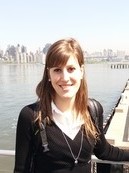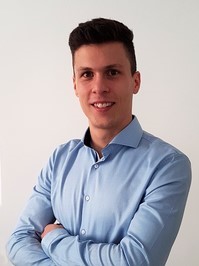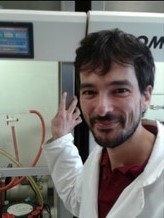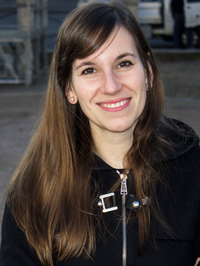|
|
DISCOVER THE NEW EFMC WEBSITE!
We are happy to announce that EFMC has a new look website. It is sleeker and more user-friendly, and it will work as well on your mobile devices as it does on your computer. Please let us know your thoughts and if you have any problems.
Have a look at it on your browser or your mobile: www.efmc.info
MEET THE NEW MEMBERS OF THE COMMUNICATION TEAM
As far as communication is concerned the more the better and we are applying principle to the Communication Team.
Please welcome the new members:
 Chiara Borsari is a medicinal chemist, working as postdoctoral fellow at the University of Basel (CH) in the group of Prof. M. Wymann. Her research is focused on the design and synthesis of small-molecule anticancer agents. Her main goal is the development of irreversible inhibitors as a novel strategy in targeted cancer therapy. She got her PhD at the University of Modena and Reggio Emilia (IT). During her PhD, she has joined the NHRF in Athens (GR) and the State University of New York at Albany (USA), where she worked on phospholipids and polymersomes synthesis. She is also keen on communicating her science to the public. In 2019, her short movie “Life in Colour”, explaining the advancements in cancer research, has won the Jury Prize at the Exposure Science Film Hackathon. She has joined the EFMC communication team to boost the awareness of the importance of Medicinal Chemistry in science. Chiara Borsari is a medicinal chemist, working as postdoctoral fellow at the University of Basel (CH) in the group of Prof. M. Wymann. Her research is focused on the design and synthesis of small-molecule anticancer agents. Her main goal is the development of irreversible inhibitors as a novel strategy in targeted cancer therapy. She got her PhD at the University of Modena and Reggio Emilia (IT). During her PhD, she has joined the NHRF in Athens (GR) and the State University of New York at Albany (USA), where she worked on phospholipids and polymersomes synthesis. She is also keen on communicating her science to the public. In 2019, her short movie “Life in Colour”, explaining the advancements in cancer research, has won the Jury Prize at the Exposure Science Film Hackathon. She has joined the EFMC communication team to boost the awareness of the importance of Medicinal Chemistry in science.

Matic Proj is a recent graduate, currently working as a Medicinal Chemistry Researcher at the Faculty of Pharmacy, University of Ljubljana, Slovenia. His research is focused on the design, synthesis and chemical analysis of novel organic compounds as potential enzyme inhibitors. Matic is active in a national Pharmaceutical Students’ Association, working as a Public Relations Representative. As one of the youngest members of the team with a great passion for science, he contributes his ideas, computer and social media skills. He has joined the team to gather new knowledge and experience, while promoting the field of Medicinal Chemistry and facilitating communication.

Lorenzo Botta is Lecturer at the University of Rome Tor Vergata. Since 2015 he is working in the Group of Prof. R. Saladino at the Tuscia University of Viterbo. The main focus of his research is the synthetic modification of bioactive natural products by the use of novel methodologies. He got his PhD at the University of Siena in 2010 working on the development of new methodologies for the synthesis of biologically active compounds endowed with HIV1 inhibitory activity. During his PhD he spent three months at the ETH of Zurich in the group of Prof. K.H. Altmann working on the synthesis of side chains for the Hypermodified Epothilone analogs and one year at The Scripps Research Institute (TSRI) of San Diego in the group of Prof. K.C. Nicolaou working on the total synthesis of natural products. After his PhD he spent one year at the Columbia University of New York in the group of Prof. S.A. Snyder working on the synthesis of natural products and three years at the University Federico II of Naples in the group of Prof. E. Novellino working on the synthesis of small molecules as potential anticancer agents. Moreover, from 2016 to 2018 he was board-member in the Young Group of the Italian Chemical Society (SCI) representing the Division of Medicinal Chemistry.

Leire Iralde Lorente is a current final year PhD student on Medicinal Chemistry at the University of Siena (Italy) with a Marie Curie Early Stage Researcher grant (ESR). Her thesis project is focused on the design and synthesis of small molecules that could mediate their activity by modulating protein-protein interactions (PPIs) and their use as a novel class of therapeutic agents. More specifically, she is targeting the adapter protein 14-3-3 which by interaction with multiple phosphorylated protein partners plays a key role in the development of human diseases. Leire is passionate about the medicinal chemistry and joined the EFMC to help promoting this field.

Michele Mari is a Postdoctoral Scientist in Medicinal Chemistry at University of Urbino Carlo Bo, He achieved his Ph.D. in Chemical and Pharmaceutical Sciences from the same university working on the strategic indole functionalization for the synthesis of tryptophan containing alkaloids and biologically active tryptamines. He spent 9 months at ETH Zurich as visiting researcher working on the total synthesis of proteins. In september 2017 he founded GLUOS (innovative Start up and University Spin off on the synthesis of molecules for medical devices) with some colleagues and he is actually the President of the Board of Directors of the company. He is also member of the organizing committee of the European School of Medicinal Chemistry, and he is active locally in spreading the importance of soft skills and entrepreneurship vision. The driving force that makes him so active is an infinite passion for Science.
Check out the full team here
EFMC PHOTO COMPETITION 2019: ELEMENTS OF LIFE, IS OPEN!
To celebrate the International Year of the Periodic Table of Chemical Elements 2019 (IYPT2019), we challenge you to share your best picture representing The Elements of life! #EFMC_PHOTO19
The winner will receive a prize of €200!
There will also be prizes of €100 for two runners-up.
In addition, the best pictures will appear in cover of several issues of the EFMC Newsletter “MedChemWatch” and will be showcased in the annual Yearbook.
Eligibility
We want scientists from any level (eg. students to expert professionals) and affiliation (eg. academia and industry) to take the best shot possible and enter the competition!
Judging Criteria
The pictures will be judged by a two-round public vote. First online and afterwards during the “EFMC-ASMC'19”, where the best shots will be printed out and displayed at the conference for participants to vote live!
Submit your picture! I AM A MEDICINAL CHEMIST/CHEMICAL BIOLOGIST: MEET MARTINA DURCIK (UNIVERSITY OF LJUBLJANA, SLOVENIA)
In this edition, we are pleased to introduce Martina Durcik from the University of Ljubljana. In addition to discovering new antibiotics, she has been able to start a fire alarm while cleaning a dish washer. Do you also have similar skills?
How did you get interested in Medicinal Chemistry?
I have always liked chemistry, since I was a child. Then in the third year of my pharmacy studies I got in touch with medicinal chemistry and I knew that it interests me the most. So, I did my research work for the master thesis in the field of medicinal chemistry and I just wanted to continue doing that.
Where and when did you obtain your PhD diploma?
I am currently in the first year of my PhD studies.
What was the topic of your PhD project?
I am working on the discovery and synthesis of new DNA gyrase B inhibitors with broad spectrum antibacterial activity. Additionally, I work with different cell lines to evaluate the cytotoxicity of our compounds and I am also engaged in biochemical evaluation of compounds that are potential new Hsp90 inhibitors.
Where do you work at the moment and what is your current position?
I am a young researcher at the department of medicinal chemistry at the Faculty of Pharmacy, University of Ljubljana.
What do you like most in your job?
What I like and what drives me is doing something new, something unknown, like synthesizing compounds for the first time, getting new results and learning or discovering new things. I am always excited when I see a nice NMR of a new final compound or when I am waiting for the microplate reader to read the plate to see what numbers I get.
What kind of tasks your job includes?
Mainly it includes organic synthesis and analytics of small molecules, working with cell lines and performing biochemical assays on the cells. Then there is »office work«, like writing articles, and I am also involved in pedagogic work by assisting with practical exercises in subject Instrumental pharmaceutical analysis.
What kind of skills your job requires?
First are of course lab skills, but communication and writing skills are also important. Doing chemistry, it is important to be patient and persistent, because not everything always works for the first time already. Accuracy is also very important, especially during biochemical assays. I would say that it is also important to be courageous to sometimes just try something and see what happens (OVERthinking doesn't always help). If you mess up and lose a compound – well you do, but I think that more times than less you’ll get a positive result and if not, you still learn something.
What do you consider your biggest achievement in your scientific career?
So far, when my very first article (being the first author) was published I felt like on top of the world and it was a real encouragement for the future, but I think that my biggest achievement is yet to come.
What are the features of a successful PhD student or postdoc?
I think you have to be curious, eager to learn, persistent and it is important to have a good work attitude.
What is the most embarrassing thing you did in the lab while doing experiments, e.g. explosions?
There was quite a funny incident (fortunately not dangerous) when me and a colleague of mine were cleaning the dish washer (another funny incident was how it actually got dirty, but this was not my doing) and we were able to set off the fire alarm with the dish washer. Probably not everybody knows how to do this.
Which paper of yours you are the proudest of and why?
I was proud of my papers whenever I saw the e-mail about the acceptance of the manuscript. But the current research with very successful results that I am most proud of was not published yet.
What would you guess to be the next major breakthrough in medicinal chemistry?
My answer could be biased since I am working on antibacterials, but as CDC once declared – we have reached the post-antibiotic era. So, I think that marketing new antibacterial agents with new mechanisms of action against the quickly spreading multi-drug resistant bacteria, to again gain advantage in the fight against bacterial infections, would be of great importance.
EFMC SUPPORTS THE 6th SEQT YOUNG RESEARCHERS SYMPOSIUM
The EFMC is happy to promote the 6th Young Researchers Symposium, organized by the SEQT.
As in former editions, this Symposium is aimed to give the opportunity to Post-doc, Pre-doc, Master’s degree, and Bachelor’s degree students to show and discuss their results. However, registration is also open to both junior and senior researchers.
Invited Speakers:
• Merche Aranda, Ideare Learning and Innovation, Spain
• Xavier Barril, University of Barcelona, Spain
• Lola Jiménez-Alfaro, GSK, Spain
• Christian Ottmann, Eindhoven University of Technology, The Netherlands
Abstract submission deadline is April 30, 2019.
For more information contact: simposioji@iqm.csic.es
Link with them on Twitter (@YRS2019) and spread the word using hashtag #MADMedChem.
The EFMC also encourage all National Adhering Organisations that doesn’t hold a national competition for postgrads to consider starting one, and to the existing one to liaise with the EFMC Young Scientist Network to help with promotion! NEWS FROM THE SECTION MEDICINAL CHEMISTRY OF THE ROYAL NETHERLANDS CHEMICAL SOCIETY (KNCV)
Dr Marc Baggelaar Wins the Dutch Medicinal Chemistry Prize 2017-2018
On March 22nd, 2019 the Division Medicinal Chemistry of the Royal Netherlands Chemical Society (KNCV) awarded Dr. Marc Baggelaar of Leiden University out of 4 nominees the two-yearly Medicinal Chemistry Prize for the best Dutch Ph.D. thesis.
In April 2017 Marc Baggelaar obtained his PhD title cum laude for his thesis ‘Activity-based protein profiling of diacylglycerol lipases’. The work was supervised by Prof. dr. Mario van der Stelt and Prof. Dr. Hermen Overkleeft and part of the research was conducted in the group of Prof. Dr. Benjamin Cravatt at the Scripps research institute in La Jolla (USA).
The jury consisted of Prof. Dr. Christa Müller (University of Bonn), Prof. Dr. Marcel Hilbert (Laboratoire d’Innovation Thérapeutique, Université de Strasbourg), Dr. Laura Heitman (Universiteit Leiden) en Dr. Hans Meissner (MercachemSyncom). The prize - € 1000 (sponsored by MercachemSyncom), a sculpture and a certificate - was handed over during the spring symposium in Utrecht entitled ‘Postgenomic Strategies in Drug Discovery’ (110 attendees), where dr. Marc Baggelaar presented the winning work. He now is doing postdoctoral research as a Marie Curie fellow in the group of prof. dr. Ed Tate at Imperial College London.

The winner Marc Baggelaar with Hans Meissner (left) and Laura Heitman (right) NEWS FROM THE BIOLOGICAL AND MEDICINAL CHEMISTRY SECTOR (BMCS) OF THE ROYAL SOCIETY OF CHEMISTRY (RSC)
The BMCS is pleased to report the prize ceremony of the RSC-BMCS Hall of Fame winner: Prof. Sir Robin Ganellin, and announce some upcoming events.
BMCS MASTERING MEDCHEM V SYMPOSIUM: PRESENTATION TO INAUGURAL RSC-BMCS HALL OF FAME WINNER PROFESSOR SIR ROBIN GANELLIN FRS
Professor Ganellin was presented with a medal and certificate in honour of his induction into the ‘RSC-BMCS Medicinal Chemistry Hall of Fame’ at the 5th Mastering Medicinal Chemistry symposium which was held at the Lilly Research Centre in Erl Wood, Windlesham UK on Wednesday 13th March 2019. The purpose of this award is to recognize prominent chemists for outstanding, sustained, and significant scientific impact, or contributions to any area of interest to the BMCS, e.g. medicinal chemistry, agriscience, bioorganic chemistry, chemical biology. Professor Ganellin has inspired chemists and those in the pharmaceutical industry for decades. He devised the syllabus and taught for many years at the now well established RSC Medicinal Chemistry Summer School. He is a drug hunter, and has had exceptional industrial and academic careers. His pioneering work, including the discoveries of the first histamine H2 and H3 receptor antagonists as medicines, has changed the lives of millions of patients
The award address was given by Sir Simon Campbell FRS who remarked that Professor Ganellin’s involvement in the design and discovery of the H2 antagonist cimetidine involved ground-breaking medicinal chemistry and paved the way for more rational drug design. The award and certificate were then presented by Andrew Williams, a Research Fellow at Lilly Research Laboratories and BMCS chairman
A fuller report on this symposium will appear in next month’s MedChemWatch
Five of the presentations at this symposium are available to download free from our website in .pdf format – go to www.maggichurchouseevents.co.uk/bmcs
30TH SYMPOSIUM ON MEDICINAL CHEMISTRY IN EASTERN ENGLAND
2nd May 2019, Hatfield, UK
Website: http://www.rsc.org/events/detail/36597/30th-symposium-on-medicinal-chemistry-in-eastern-england
Synopsis: This is the 30th in a series of highly successful, long-standing, one-day meeting symposia which run annually. The scientific programme comprised presentations showcasing medicinal chemistry case studies from tools to candidates, across a range of modalities, therapeutic areas and target classes, as well as covering more general topics from the forefront of drug discovery of relevance to medicinal chemists.
RSC / SCI CONTINUOUS FLOW TECHNOLOGY IV
14th to 16th May 2019, Manchester, UK
Website: http://www.rsc.org/events/detail/31064/continuous-flow-technology-iv
Synopsis: The meeting is directed at individuals with a curiosity into what Flow is and how it may benefit them or their organisations, and those already involved in the area. The presentations will cover aspects from microfluidics discovery to production scale manufacture, highlighting the latest developments, novel methods, engineering and their application. NEWS FROM THE FRENCH MEDICINAL CHEMISTRY SOCIETY (SCT)
The deadline for submission for the Pierre Fabre Award for Therapeutic Innovation is April 19th, 2019
Pierre Fabre, founder of the "Laboratoires Pierre Fabre", the second biggest independent pharmaceutical company in France, was an entrepreneur with a passion for science and pharmaceutical research for the benefit of humankind. He was a visionary manager, and, until the last moment of his life, he was involved in developing pharmaceutical activities, while being very close to his associates.
The name of Pierre Fabre is strongly associated with the spirit of “Therapeutic innovation”. In honour of its founder and in association with the French Medicinal Chemistry Society, the company Pierre Fabre Médicamenthas a new award to recognise a decisive action, a scientific discovery or an innovative technology contributing to a substantial therapeutic innovation. This contribution may rise from very early phase of research and the aim of this prize is to nominate a talented researcher.
The “Pierre Fabre Award for Therapeutic Innovation” (amount of 3000 €) will be given during the International Conference on Medicinal Chemistry (RICT), an annual SCT meeting, by a Pierre Fabre company representative and the SCT president.
The deadline for submission is April 19th, 2019
All information about the call can be found here THIS MONTH’S HIGHLIGHTED MEDCHEMCOMM ARTICLE IS:
“Computation of protein–ligand binding free energies using quantum mechanical bespoke force fields”
Daniel J. Cole, Israel Cabeza de Vaca and William L. Jorgensen compute the absolute binding free energies of six protein-ligand pairs using a quantum mechanical (QM) bespoke molecular mechanics force field, highlighting the potential of QM-derived force fields in molecular design and drug discovery. This article is one of the first out in the MedChemComm New Talent collection, showcasing emerging leaders in the field of medicinal chemistry.
A quantum mechanical bespoke molecular mechanics force field is derived for the L99A mutant of T4 lysozyme and used to compute absolute binding free energies of six benzene analogs to the protein. Promising agreement between theory and experiment highlights the potential for future use of system-specific force fields in computer-aided drug design.
Read the article!
This article is part of the themed collection: New Talent THE LATEST EDITION OF MEDCHEMCOMM, THE OFFICIAL JOURNAL OF THE EFMC, IS AVAILABLE AT:
|
|
|
|
|
|
EFMC SPONSORED EVENTS
May 15-17, 2019
Barcelona, Spain
2nd Molecules Medicinal Chemistry Symposium – Facing Novel Challenges in Drug Discovery
June 21, 2019
Madrid, Spain
6th SEQT Young Researchers Symposium
June 27-30, 2019
Prague, Czech Republic
11th Joint Meeting on Medicinal Chemistry
July 3-5, 2019
Nantes, France
55th International Conference on Medicinal Chemistry (RICT 2019)
EFMC ORGANISED EVENTS
April 28 - May 1, 2019
Oegstgeest (near Leiden), The Netherlands
15th EFMC Short Course on Medicinal Chemistry - Strategies in Fragment Based Drug Discovery
June 10-13, 2019
Krakow, Poland
EFMC-ACSMEDI MedChem Frontiers 2019
September 1-5, 2019
Athens, Greece
EFMC-ASMC'19: EFMC International Symposium on Advances in Synthetic and Medicinal Chemistry
September 5-6, 2019
Athens, Greece
EFMC-YMCS 2019: 6th EFMC Young Medicinal Chemist Symposium
EFMC ACCREDITED SCHOOL
June 30 – July 4, 2019
Urbino, Italy
39th Edition of the European School of Medicinal Chemistry (ESMEC)
EFMC SPONSORED SCHOOL
September 11-13, 2019
Pescara, Italy
Summer School in Pharmaceutical Analysis (SSPA)
September 15-20, 2019
Vienna, Austria
EUROPIN Summer School on Drug Design
|
|
